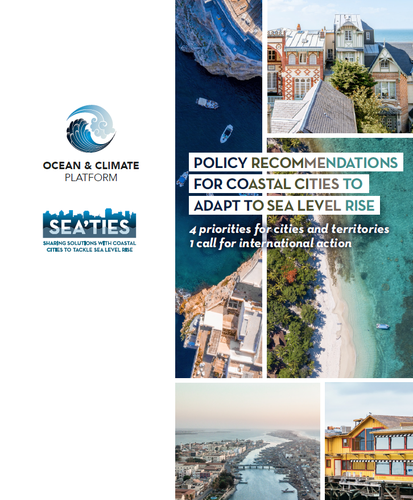Sea'Ties informs Recommendations for Coastal Cities on Sea Level Rise
The project of the Ocean & Climate Platform addresses a series of recommendations to local, national, and international decision-makers focusing on solutions, social justice, knowledge and finance.
Published on 09 November 2023 | news

© Ocean & Climate Platform
Article written by the team of the Ocean & Climate Platform
On November 9, at the One Planet – Polar Summit and just a few weeks ahead of UNFCCC COP28, the Sea’ties initiative unveils a series of policy recommendations for coastal cities to adapt to sea level rise.
Concluding four years of the Sea’ties initiative, the “Policy Recommendations to Coastal Cities to Adapt to Sea Level Rise” draw upon the scientific expertise and on-the-ground experiences of over 230 practitioners convened in 5 regional workshops organised in Northern Europe, the Mediterranean, North America, West Africa, and the Pacific. Now supported by 80 organisations worldwide, the policy recommendations are intended to local, national, regional and international decision-makers, and focus on four priorities:
- Solutions – Planning long-term adaptation responses tailored to the local context:
Adapting means shifting our approach towards long-term planning that anticipates different scenarios of sea level rise, while remaining flexible to potential environmental and societal changes. It entails mixing and phasing multiple solutions (hard and soft protection, ecosystem-based adaptation, hybrid solutions, accommodation, planned relocation etc.) across time and space.
- Social justice – Prioritising social imperatives in adaptation policies:
Considering the propensity of reinforcing inequalities through adaptation policies i.e. maladaptation, it is primordial to centre social justice into all decision-making. Meaningful engagement of communities is key and implies dedicating significant time and resources for engaging communities and to pay particular attention to the ones that have been traditionally underrepresented.
- Knowledge – Developing new ways to generate and share operational knowledge on adaptation:
Strengthening the collection of observation and local data is critical and notably entails developing pluridsciplinary research as well as involving holders of local and indigenous knowledge. To better inform decision-making, further assessments on the feasibility of solutions and monitoring of their impacts are needed.
- Finance – Building a sustainable finance approach for coastal cities:
Coastal cities cannot bear alone the cost of adaptation and need to rely on a financial model based on solidarity which involves all stakeholders impacted directly or indirectly, including inland territories and the private sector. Meanwhile, local financial engineering must be strengthened. Leveraging territorial cooperation and local intermediaries such as regional development banks, is key for cities to access additional resources while providing integrated responses.
Read more on the OCP's webpage
You can download the recommendations here
To read more about Sea'Ties, visit our dedicated page.